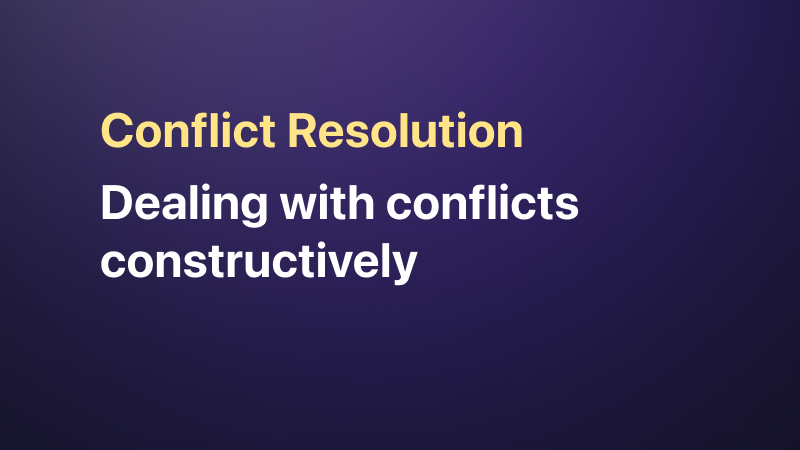Conflict Resolution: Strengthening Your Relationship
Conflicts in relationships are like unexpected rain showers—they can pop up out of nowhere and, if handled right, can actually nourish your connection. But let’s be honest: arguments aren’t fun. They can feel like an emotional rollercoaster, complete with all the loops and stomach drops. The trick isn’t to avoid conflict altogether (because that’s impossible), but to turn those stormy moments into opportunities for growth and understanding. When handled with care, conflicts can be the secret sauce that strengthens your bond, not something that pulls you apart.
1. Why Conflict Isn’t the Villain in Your Love Story
Let’s bust a myth: conflict doesn’t mean your relationship is doomed or dysfunctional. In fact, it’s totally normal. Two people with different perspectives, experiences, and feelings are bound to clash from time to time. The key is in how you handle it. Think of conflicts as the grit that, when approached with care, polishes the relationship and makes it shine brighter.
2. The Do’s and Don’ts of Conflict Resolution
Do: Stay Curious Instead of Furious
When an argument starts brewing, it’s easy to go on the defensive or unleash the blame game. Instead, try to get curious. Ask yourself, “What’s really going on here?” or “Why is this so important to my partner?” Shifting from anger to curiosity opens the door to deeper understanding and can turn a heated moment into a chance to learn more about each other.
Don’t: Play the Blame Game
“Always” and “never” statements are like throwing gasoline on a fire. They rarely solve anything and usually just make things worse. Instead of pointing fingers, focus on how you feel. Swap “You never listen to me!” with “I feel unheard when this happens.” It’s a small shift that makes a big difference.
Do: Hit the Pause Button When Needed
If things get too heated, it’s okay to call a timeout. Taking a break doesn’t mean avoiding the issue; it means giving both of you the space to cool off and gather your thoughts. Agree to come back to the discussion once you’re both in a better headspace. A clear mind is much better for problem-solving than a heated heart.
Don’t: Avoid the Issue
Sweeping conflicts under the rug might feel easier in the short term, but it’s like letting a pot simmer with the lid on—it’s going to boil over eventually. Address issues as they come, even the small ones. Unresolved little annoyances can pile up and turn into major explosions later on.
Do: Listen More Than You Talk
Most of us are guilty of listening just to respond instead of to understand. Try giving your partner the floor—really listen to what they’re saying without planning your comeback. Validate their feelings, even if you don’t agree. A simple “I see why you feel that way” can go a long way toward defusing tension.
3. Turning Arguments into Growth Opportunities
Every conflict holds the potential to bring you closer. Here’s how to turn a tense moment into a stepping stone for your relationship:
1. Find the Common Ground
At the heart of most conflicts, there’s often a shared goal—you both want to feel valued, heard, and understood. Look for that common ground and use it as the foundation for moving forward. This isn’t about who’s right or wrong; it’s about finding a solution that honors both of you.
2. Apologize Like You Mean It
A genuine apology isn’t just about saying “I’m sorry.” It’s about taking responsibility for your part and acknowledging the impact it had on your partner. Ditch the half-hearted “I’m sorry you feel that way” and go for something real: “I’m sorry I reacted that way. I can see how it upset you.”
3. Make Repair Attempts (Even Silly Ones)
Repair attempts are those little things you do to break the tension—like cracking a joke, giving a hug, or just saying, “We’re on the same team.” They’re simple, but they remind you both that, at the end of the day, you’re in this together.
4. Learn from the Disagreement
Reflect on what triggered the conflict and what you can both learn from it. Did a certain tone or phrase set things off? Was there a misunderstanding that could have been clarified earlier? Use each conflict as a guidepost to better communication next time.
Self-Reflection Question:
- How can I approach our next disagreement with more understanding and less defensiveness?
Quiz: Are You Handling Conflicts Constructively?
-
When a conflict arises, what’s your initial reaction?
- A) I get defensive and argue my point
- B) I try to listen, but it’s hard not to react
- C) I stay calm and focus on understanding my partner
-
How do you usually express your feelings during an argument?
- A) I often blame or criticize
- B) I try to express my feelings but get caught up in the moment
- C) I use “I” statements and focus on how I feel
-
How do you feel after resolving a conflict with your partner?
- A) Frustrated or still upset
- B) Relieved but not completely satisfied
- C) Closer and more connected
Results:
- Mostly A’s: It might be time to rethink your conflict approach. Focus on listening and expressing yourself calmly.
- Mostly B’s: You’re making progress but could benefit from slowing down and staying present during disagreements.
- Mostly C’s: Great job! You’re turning conflicts into opportunities for growth—keep it up.
Conflict doesn’t have to be a dealbreaker in your relationship. With the right approach, you can turn disagreements into opportunities for understanding, connection, and growth. Remember, it’s not about winning—it’s about growing stronger together.




